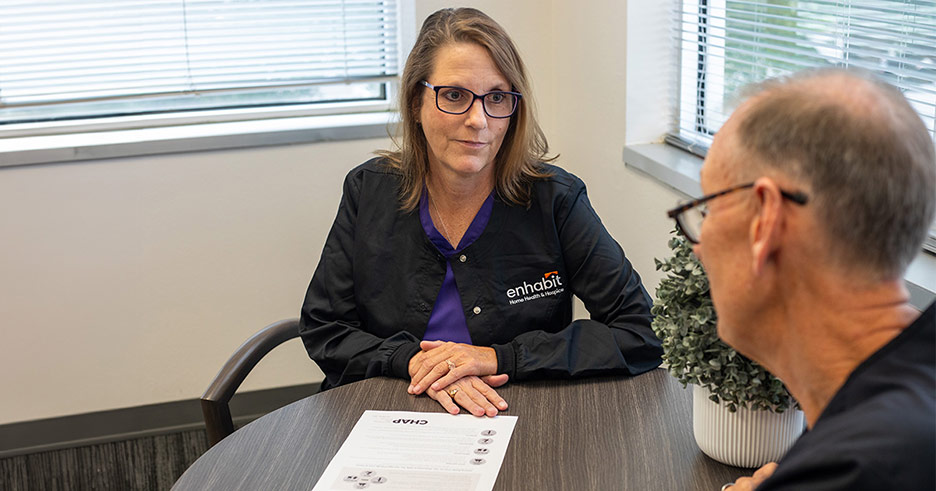When patients are affected by a neurological disorder or event such as Parkinson’s disease, dementia, a stroke, or a brain injury, they often work with a speech-language pathologist to help improve and regain their communication, swallowing and cognitive skills.
In home health care, speech-language pathologists specifically help patients who are homebound. This means they cannot leave their home without a considerable and taxing effort.
The patient population for a home health speech-language pathologist is similar to the patient population seen in other medical settings such as hospitals or other clinical environments. Oftentimes, home health speech-language pathologists work with patients who have experienced a stroke, or those with progressive diseases such as Parkinson’s disease or dementia.
What does a home health speech-language pathologist do?
A home health speech-language pathologist evaluates and treats patients with language impairments, motor speech disorders, dysphagia, cognitive communication difficulties, voice disorders and those requiring alternative or augmentative communication.
Although each patient’s needs are different, home health speech-language pathologists focus on:
- Introducing strategies to regain communication and socialization skills
- Improving language skills for expression and comprehension
- Strengthening the muscles necessary to improve verbal communication, swallowing and breathing
- Teaching caregivers strategies to decrease anxiety and agitation caused by communication difficulties
- Ensuring safe and adequate oral intake and swallowing
- Developing ways to manage personal affairs after stroke, brain injury or dementia
- Improving safety awareness and judgment through cognitive training and family education
What is it like to be a home health speech-language pathologist?
Since home health speech-language pathologists work with patients one-on-one from a patient’s home setting, each day can look very different.
“My typical caseload varies based on whatever the need is that day,” Allison, a home health speech-language pathologist at Enhabit Home Health & Hospice, said. “Right now, I have a handful of patients with Parkinson’s that we’re working on voice; I have a handful of patients working on cognition; I have a lung cancer patient right now working on swallowing; and a patient who is working on expressing themselves and word retrieval strategies. So, my days look very different depending on my caseloads.”
As with other home-based care professionals, home health speech-language pathologists get out on the road, traveling from patient to patient. This allows for flexibility in scheduling and the ability to build your day around personal and professional needs.
And while the added flexibility is great benefit, the best part about being a home health speech-language pathologist is getting to see patients progress, according to Allison.
“Getting patients to buy in to therapy and then see the progress and payoff – that’s my favorite part,” she said. “When you get them on board and they see that I am here to help and they can say their spouses name for the first time and they can say ‘I love you’ to their spouse or their kids, you just see their face light up.”
The importance of a speech-language pathologist in home health care
Speech therapy is an important part of a patient’s recovery. It helps patients learn how to communicate better through improving their language skills and mental processes related to speech and communication.
“In home health, speech therapy is very vital as a part of developing cognition to be able to do simple things like take your medications on time,” Allison said. “It’s very important that we’re helping and coming up with strategies for patients to be able to follow simple directions.”
The transition from the hospital or inpatient rehabilitation to home health care can be difficult for patients as they’re used to someone else monitoring their schedule and care. It’s necessary for patients to know how to express themselves once in the home environment since there is not a nurse around 24/7, Allison says.
“Being able to express themselves is very important,” she said. “If you’re getting someone immediately post-stroke for example, they went through some acute rehab but they might not have had the focus on being able to express themselves. Transitioning from rehab to home, it’s very important to have a solid team to help with cognition and expressing themselves – and that’s what speech-language pathologists do.”
Patient success story
Allison sees the impact of her work daily, and in particular with one patient who she refers to as her greatest success. He came to Enhabit really struggling to find his words. He had trouble getting thoughts and messages across due to a degenerative neurological disease.
“At first, he was not one to buy in to therapy,” Allison said. “But to get him to trust in therapy and independently implement the strategies I’ve taught him, he’s now able to organize his thoughts completely.”
By using the skills learned in speech therapy, Allison’s patient was able to regain important communication abilities. Now, he uses his experience to inform others.
“Now, my patient has started a podcast for his disease where he goes through his journey and provides information for people on where to look for resources about the disease,” Allison said.
How do I start my career in home health?
There are many benefits that come along with choosing a career in home health care. If interested in helping patients regain communication, swallowing and cognitive processing abilities, you might enjoy a career in home health speech-language pathology.
And even if you’ve never worked in a home health setting before, Allison says it’s worth the try.
“Home health provides you with the flexibility to do things like raise your family, go to doctor’s appointments, things like that,” she said. “Even if you’ve never worked in home health before, just go out and try it. The more that you get yourself out there and try different things, you will start to see how important home health is.”
The path to becoming a home health speech-language pathologist is the same as being a speech-language pathologist in any other environment.
You must first earn a bachelor’s degree in communication sciences and disorders or a related field such as psychology, education, linguistics or language development. Then, you must earn a master’s degree in speech-language pathology and take and pass the national Praxis Examination in Speech-Language Pathology. Lastly, you must complete a clinical fellowship.
If interested in pursuing your home health speech-language pathology career at Enhabit, you must be currently licensed as a speech-language pathologist in the state of employment.
To learn more about home health career opportunities at Enhabit, search our open career opportunities near you or sign up for job alerts by texting “CARE” to 98199.
 Back to Resource library
Back to Resource library
Browse top categories
Social Share
At Enhabit our patients are our number one priority. From providing the latest medical practices to building deep personal connections, we’re focused on upholding every patient’s dignity, humanity and sense of control on their health care journey.
Home health
Our home health services give patients access to the care they deserve in the comfort of their own homes. From disease and injury management to recovery from surgery, our clinicians help patients confidently achieve their health care goals.
Hospice care
Our hospice care services place importance on the comfort of every patient living with a terminal illness. Our caring professionals are dedicated to providing not just physical care, but spiritual and emotional support to every patient and their loved ones.






